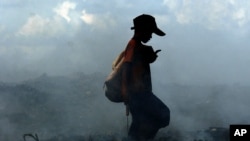As world leaders prepare for a major summit on climate change in Paris this December, Cambodian officials say industrialized nations should provide support to lesser developed countries, to offset their contributions to global warming.
Like other countries, Cambodia is preparing its own plan to contribute to the fight against climate change, under UN protocols called Intended Nationally Determined Contributions, or INDC.
That includes policies to preserve natural resources and biodiversity, Sao Sopheap, a spokesman for the Ministry of Environment, said.
Cambodia has seen a massive reduction to its forest cover over recent decades, losing a potential carbon sink that would mitigate climate change. Still, Cambodian officials say they are not a major greenhouse gas contributor and should receive support from those countries that are.
Still, Cambodia is willing to decrease its own emissions, Sao Sopheap said. “We are not a country that has as much greenhouse gas [emissions] as other countries with a lot of industry, so Cambodia is not compulsorily obliged to reduce greenhouse gases, but it is our political will, as Cambodia is a signatory of the UN,” he said.
Industrialized countries should take responsibility for climate change and help countries like Cambodia cope with it, he said. “Cambodia also demands technical support, as well as training in skills regarding reducing greenhouse gas,” he said. “We request that countries with heavy industry be accountable.”
In Cambodia, effects of climate change could mean shifts in weather patterns, creating drought in some areas and flooding in others. It will also affect the coast, as sea levels rise.
“We have many plans to be executed by state institutions, such as work at the coast,” Sao Sopheap said. “We are trying to improve their livelihoods, so they can live up to the costs of climate change. When we do this kind of work, we need technical and financial support.”
UN Environment Program Executive Director Achim Steiner said during a seminar in Sao Paulo recently that the world needs global cooperation to tackle climate change.
“Done right, the work toward these goals can lead the planet and its peoples toward a more prosperous, sustainable future,” he said, in a speech posted on UNEP’s website. “Our world is composed of systems too complex, too integrated for one body to tackle alone.”
NGO Forum Director Tek Vannara said the government has taken about 60 percent of the input given by NGOs for its INDC. Cambodia must maintain its remaining forest cover, he said, not only to help battle climate change, but for the people who depend on it.
“We encourage relevant institutions to protect our last Cambodian forests, to promote Cambodia’s livelihoods, especially those under the poverty line, who can benefit from the mutual resources of forests in their area,” he said.
The government, meanwhile, can work to ensure that Cambodians live in green cities and clean environments, and to help cut down the use of individual vehicles, he said.
The NGO Forum will release its own report on climate change Oct. 25 and will request that the government include it in its report in Paris.








